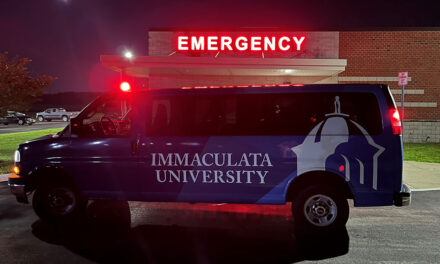By Lydia Szyjka ’09 M.A.
Lisa Bailey-Davis ’00, D.Ed., RD, has dedicated her career to improving nutrition, food security and health equity for rural, low-income families. With a unique approach that targets prevention at its earliest stages, Bailey-Davis leverages her inspiring personal experiences and professional expertise to create lifelong change.
A Rural Upbringing Shapes a Passionate Calling
Growing up in rural Pennsylvania with Appalachian roots, Bailey-Davis witnessed firsthand the challenges of health disparities in small, tight-knit communities. As the first in her family to graduate from college, she set out to address these disparities through education, prevention and activism.
After earning her master’s in nutrition from Immaculata, she was motivated by her desire to educate, prevent and act upon health disparities, starting with her own family. In 2000, she moved to the smaller metropolitan city of Harrisburg, Pennsylvania to raise her family. “I deliberately chose a place where we could walk to places like the grocery store,” she shares, reflecting her belief in developing healthy habits in childhood.
Bridging the Gap: Education and Early Career
Bailey-Davis earned a bachelor’s degree in nutrition science and a doctorate in adult education from Penn State University, with a master’s in between. Immaculata’s requirement for an internship proved a pivotal turning point in her career. After completing her internship at the Reading Hospital and Medical Center, they created an in-patient and out-patient dietitian position and offered it to Bailey-Davis. Her focus on helping patients with weight management became the cornerstone of her career.
Currently, as a professor of Nutrition and Pediatrics in the Department of Population Health Sciences and associate director of the Center for Obesity and Metabolic Research at Geisinger College of Health Sciences, Bailey-Davis credits Immaculata University with shaping her teaching philosophy. “Every class required us to teach what we learned to our peers,” she recalls. “It built my confidence and creativity in teaching techniques.”
Tackling Obesity in Rural Communities
During her professional career, Bailey-Davis’s obesity research highlights the challenges faced by rural communities, including high rates of unemployment, limited education opportunities, single-parent households, lack of transportation, social isolation and restricted access to healthy, affordable food. She has delved into community factors contributing to childhood obesity and explored solutions to counteract these barriers.
Her studies emphasize responsive parenting—teaching parents to recognize their infants’ hunger cues rather than relying on food as a soothing mechanism. “Every time they cry, it doesn’t mean they’re hungry,” she explains. “Maybe they just need a hug.”
Despite the growing visibility of weight management issues due to advances in medication, Bailey-Davis acknowledges that obesity remains a sensitive topic. Her work combines clinical insights with community action, creating a multi-level framework that addresses individuals, families and the communities where they reside.
Expanding Nutrition Access
One of Bailey-Davis’s notable achievements is her work with the WIC (Women, Infants, and Children) program, a critical resource for low-income families. However, according to Bailey-Davis, only 46% of eligible pregnant women are enrolled in WIC, which is a 30-year low in a time when food insecurity, pre-term delivery and low birth rates are on the rise. She admits that it’s increasingly challenging for pregnant mothers to navigate clinical and community systems. “Mothers are told, ‘why don’t you call here, go here and go there,’ it’s just a lot,” she said.
Recognizing the barriers pregnant women face in navigating complex systems, she developed an initiative to simplify the process. By partnering with OBGYN offices, her program ensures eligible mothers are automatically connected to WIC during prenatal visits, significantly reducing the burden on the mother.
Through a program launched at Geisigner, Bailey-Davis has also been instrumental in integrating routine nutrition screenings into pediatric visits, extending from infancy to age 17. These screenings, now being adopted by hospitals nationwide, provide a foundation for early intervention and long-term health monitoring.
Continual Research That Impacts Entire Families
Looking beyond immediate needs, Bailey-Davis is exploring how adverse childhood experiences impact long-term health. By identifying mothers who have faced significant challenges during their upbringing, she connects them with resources to build resilience and strengthen protective factors for their families.
Another avenue of interest for Bailey-Davis is the Food as Medicine program that promotes food security among lower-income and rural families. This federally-backed program provides medically tailored meals and groceries, produce prescriptions, discounted or free produce and nutrition education.
A Vision for Health Equity
Bailey-Davis is starting to see the fruits of her labor. For example, positive inter-agency partnerships support citizens’ efforts to grow their own food, and raise livestock and poultry. “There are lots of wonderful things happening where people are cooking and sharing recipes. They are also learning how to address gaps in their local food system,” she added.
With tireless energy and unbound dedication, Bailey-Davis is an inspiration to all as she continues to improve nutrition, food security and health equality for rural, low-income families. Her lifelong efforts have lessened the burden on families and opened doors to resources to not only prevent obesity but to maintain healthy living for generations to come.






